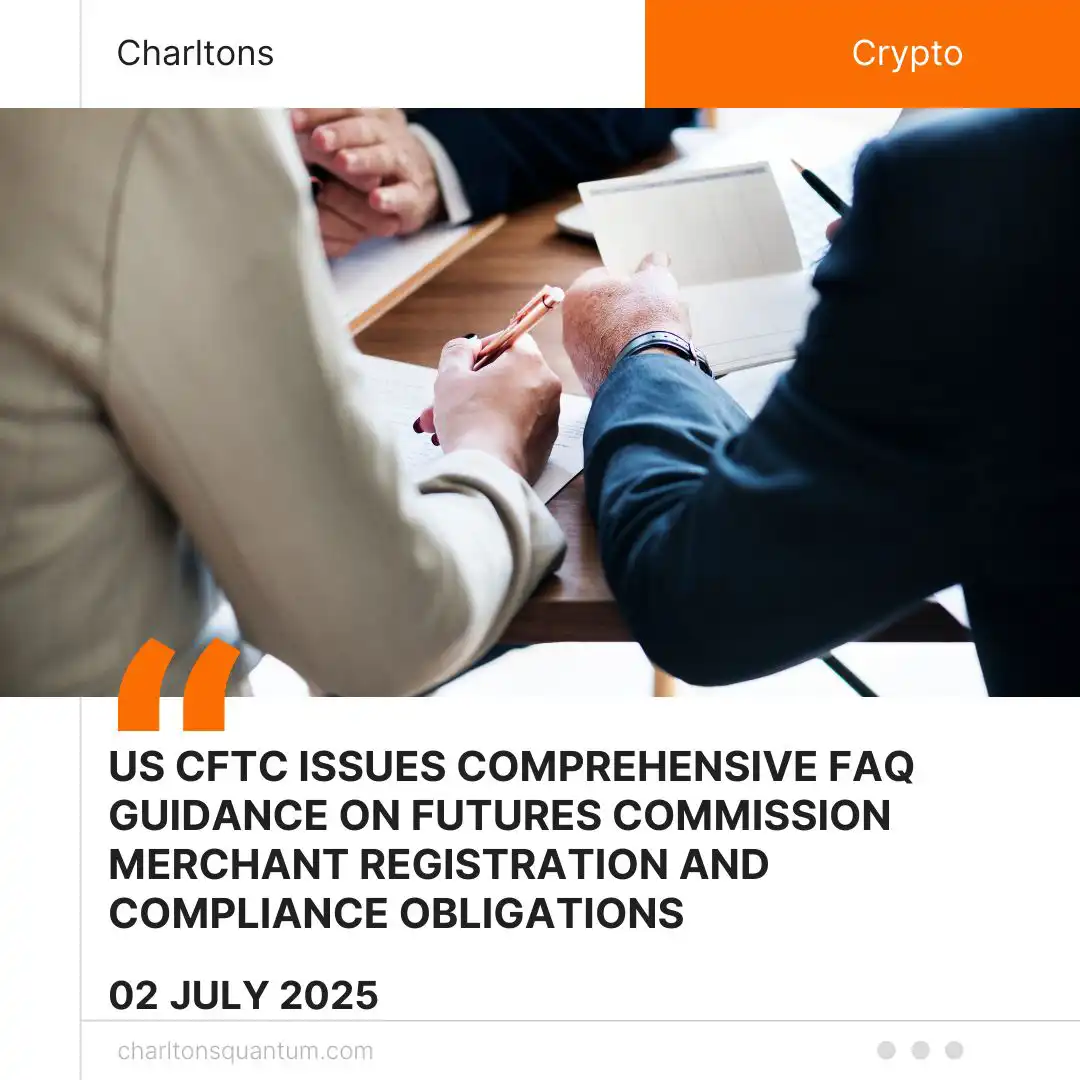
On 30 June 2025, the United States Commodity Futures Trading Commission (US CFTC) released a set of Frequently Asked Questions (FAQs) clarifying the registration requirements and ongoing compliance obligations applicable to Futures Commission Merchants (FCMs). Issued by the US CFTC’s Market Participants Division, the guidance addresses increased interest in FCM registration, particularly among entities seeking to enter the derivatives market by acquiring existing FCMs, and outlines foundational responsibilities under the Commodity Exchange Act and relevant US CFTC regulations.
The FAQs provide authoritative clarity on the procedural and operational requirements for FCM registration and ongoing regulatory compliance under the United States Commodity Exchange Act and associated US CFTC regulations (17 CFR Chapter I). The guidance applies to entities intending to register as FCMs or acquire existing FCMs and covers key areas such as recordkeeping, financial reporting, capital adequacy, AML/CFT obligations, and customer protection. The document also details National Futures Association (NFA) coordination requirements and delineates responsibilities of associated persons, compliance officers, and FCM governing bodies. This staff-issued FAQ is not binding but reflects the CFTC’s current supervisory expectations and statutory interpretation.
1. Activities Requiring FCM Registration
Entities that solicit or accept orders to buy or sell futures, options on futures, retail forex, or swaps, and receive customer funds or assets for these trades, must register with the US CFTC as FCMs. FCMs must also become NFA members, subject to NFA rules.
2. Registration Process
Prospective FCMs must submit US CFTC Form 7-R to the NFA, disclosing entity information and non-natural person principals. Natural person principals and associated persons must file Form 8-R and fingerprint cards. NFA assesses statutory disqualifications under Sections 8a(2) and 8a(3) of the United States Commodity Exchange Act, supported by FBI background checks.
3. Proficiency Requirements
Associated persons must pass the National Commodity Futures Examination (Series 3), and if engaging in swaps activity, meet the Swaps Proficiency Requirements per NFA Rule 401 and NFA Bylaw 301(l).
4. Recordkeeping Obligations
FCMs must retain transaction records, communications, original source documents, and daily financial ledgers. Records must be accessible for inspection by the US CFTC and US Department of Justice. NFA Rule 2-10 also requires a US-based supervisory office or one in an approved foreign jurisdiction.
5. Compliance Procedures
Applicants must implement written policies covering AML, business continuity, cybersecurity, supervision, and ethics. A designated Chief Compliance Officer (CCO), qualified and free of disqualification, is mandatory under 17 CFR §3.3.
6. Capital Requirements
FCMs must maintain minimum adjusted net capital as the highest of: $1 million; 8% of aggregate risk margin; US SEC-imposed capital (if dual-registered); or $20 million (for retail forex or swap dealer activity). Firms using internal risk models must meet a $100 million net capital threshold.
7. Financial Reporting
FCMs must file CFTC Form 1-FR-FCM (or US SEC FOCUS Report if dual-registered), submit daily segregation reports, and provide annual audited financials certified by an executive.
8. Risk Management Program
Registered FCMs must maintain written risk policies, a designated risk management unit, and quarterly risk exposure reports. Programs must account for market, credit, liquidity, operational, and segregation risks.
9. Responsibilities of Governing Body
The FCM’s board or managing body must approve risk programs, set the firm’s residual interest amount, and authorise major withdrawals. Officials may face liability for statutory breaches or criminal violations.
10. Duties of Chief Compliance Officer
The CCO must implement compliance programs, resolve conflicts, remediate violations, and submit an annual report under oath detailing policies, assessments, and staffing.
11. Responsibilities of Governing Body
Under the US Bank Secrecy Act and 31 CFR Chapter X, FCMs must establish written AML programs approved by senior management, conduct customer due diligence, and file Suspicious Activity Reports with FinCEN.
12. Customer Protections in Bankruptcy
US Bankruptcy Code and CFTC Part 190 Regulations safeguard customer funds by requiring segregation, providing priority claims, and defining “customer property.” There is no SIPC-style insurance coverage.
For further information, see the full document at: https://www.cftc.gov and NFA’s dedicated FCM registration portal at: https://www.nfa.futures.org.
(Source: https://www.cftc.gov/PressRoom/PressReleases/9091-25)





